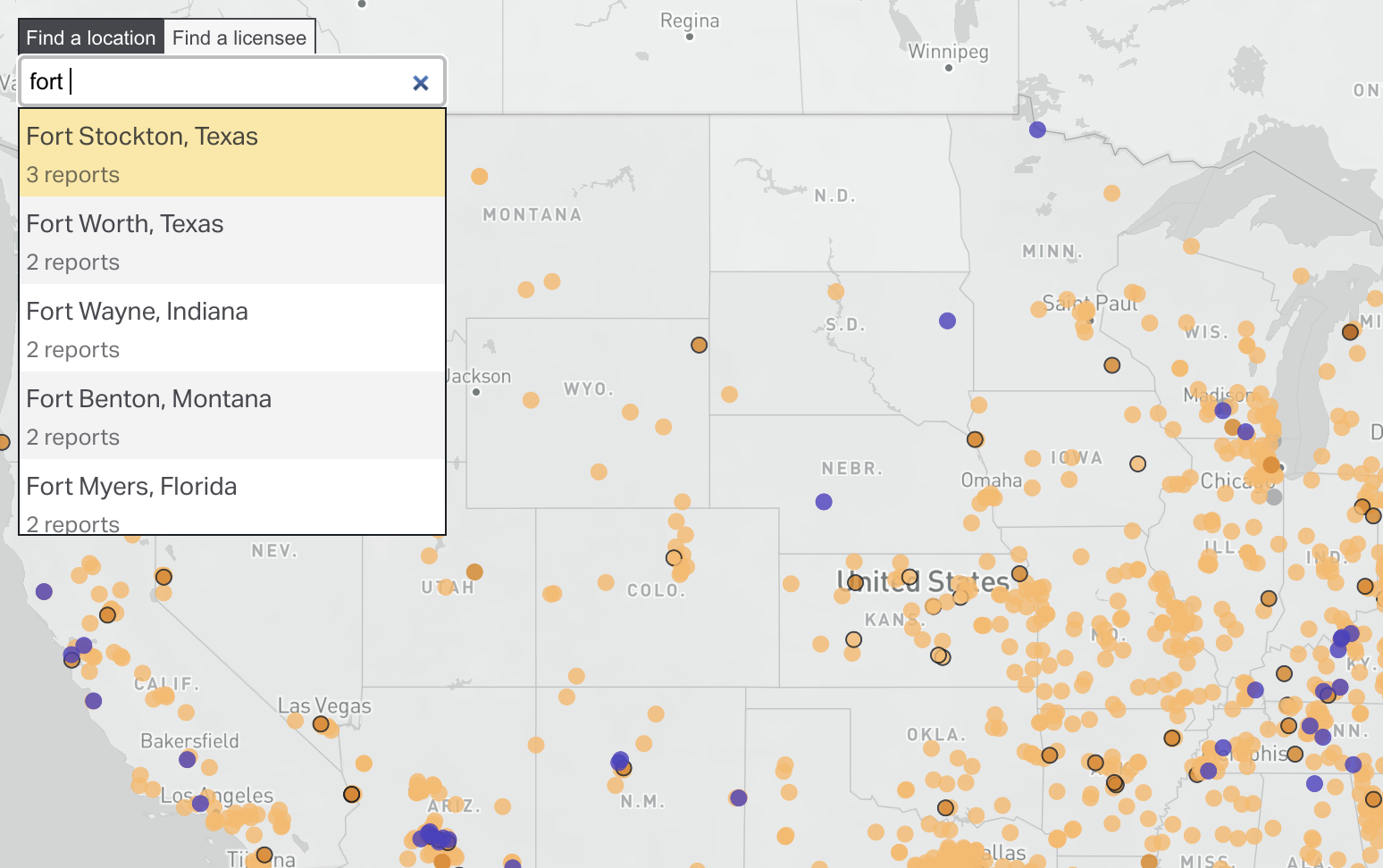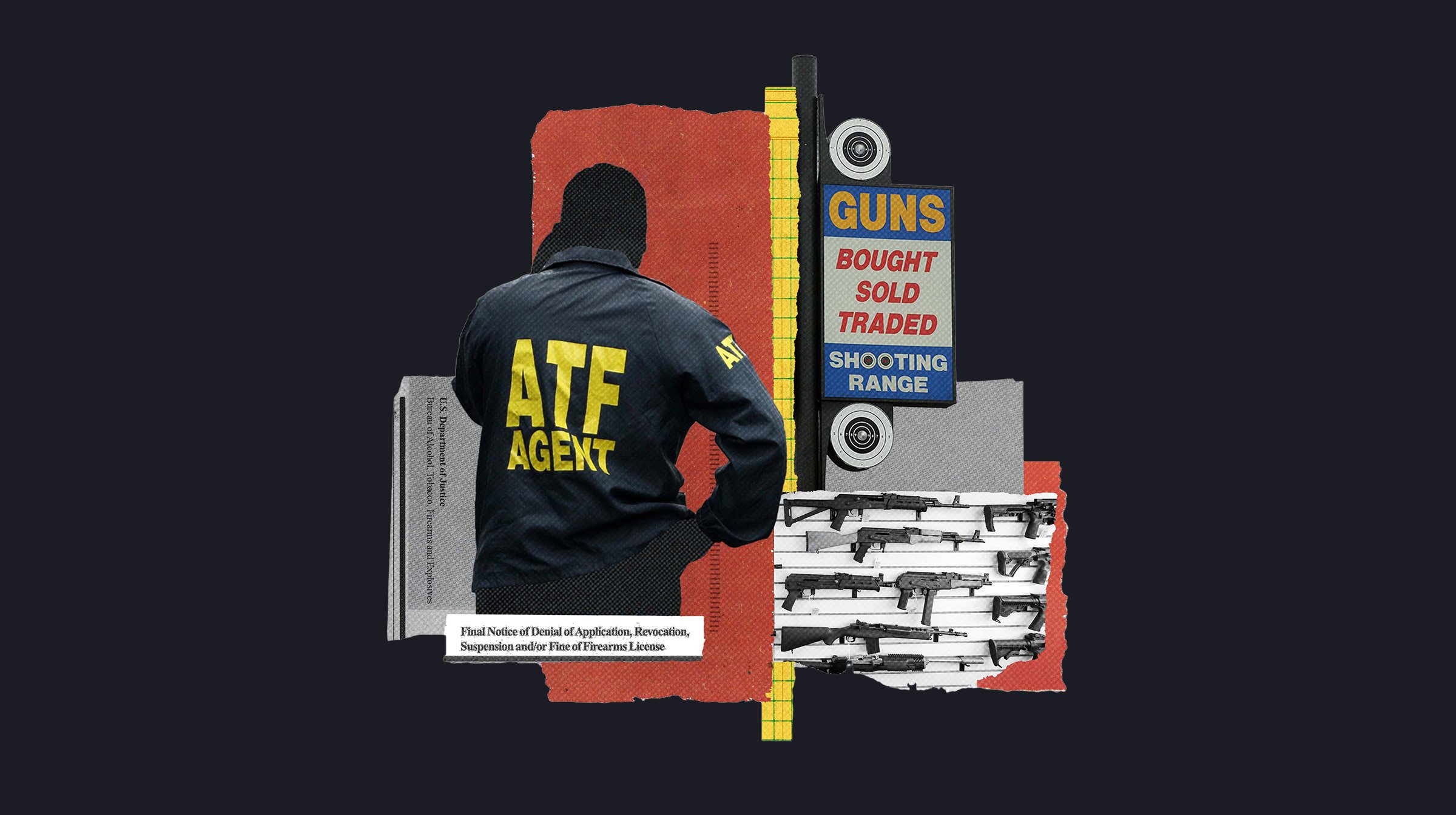The Bureau of Alcohol, Tobacco, Firearms and Explosives inspects thousands of licensed gun dealers and manufacturers each year, but what happens in those investigations is rarely revealed to the public. The Trace has built a new database that provides details on nearly 2,000 inspections during which the ATF found gun dealers in violation of federal regulations. The materials are the foundation of the investigation we published with USA TODAY, which shows that the ATF often bends over backward to go easy on stores that flout the rules and jeopardize public safety.
First, about the data: The records, which were obtained by the gun control group Brady through suing the ATF, include reports of inspections conducted between July 2015 and June 2017 that resulted in a warning letter, a warning conference, a revocation, or another penalty. Just because a store isn’t in the database doesn’t mean it hasn’t been inspected or cited for violations. Inspections that fall outside this window of time or don’t meet the criteria won’t appear in the data. Also, aggregate data published by the ATF lists many more inspections conducted during an overlapping period of time, a discrepancy the agency says it is investigating. Here’s more information about the data and our methodology.
The ATF redacted the reports to remove some key information, including the names of some gun store employees and ATF officials, and the number of times a business was cited for a specific violation. Those redactions are discussed in detail in this filing.
Read on to learn about how you can use this database to investigate gun store inspections in your area.
Go local
You can use our map, built with Mapbox, to browse and explore inspections across the country. Use the search box in the top left to search for your town or zip code, or click the second tab to search for a specific business. The database contains inspections of businesses in 49 states and Puerto Rico.

Clicking on an individual state will bring you to a page listing reports from just that state, as well as some aggregate information about the state’s inspections. From there, you can browse to individual reports, or filter down further to the county level.
Look at outcomes
The vast majority of dealers in the database received warning letters, the lightest penalty the ATF hands out for violations. Others received warning conferences, while fewer still had their licenses revoked or faced a settlement such as a suspension or fine. In general, more severe violations lead to harsher penalties, so focusing on inspections that resulted in conferences, revocations, and settlements is likely to highlight more egregious cases.
We also tracked inspections in which the ATF determined that a business had violations severe enough to warrant revocation, but handed out a lighter penalty. This category in particular is useful for identifying shops that remained in business after being cited for major violations of gun regulations.
On any page in the database, you can refer to the map legend to see how many inspections resulted in each outcome, and click on a legend item to view only that category.
Read more about the outcomes here.
Read the reports
Every gun store’s page includes detailed information extracted from PDF copies of inspection reports analyzed by The Trace. The top section contains information about the business’s location and license, and the outcome of the inspection. This section will also note if the store’s license is no longer active, which could be the result of a more recent inspection that resulted in revocation or because the dealer went out of business for unrelated reasons.
The second section outlines key dates and steps in the inspection process. In particular, the recommendation and review sections often contain narrative text that can include important details about the inspection process and what ATF officials found. These sections contain pop-up definitions for some key pieces of jargon.

The final section lists the individual violations that the dealer was cited for.
The report pages contain much, but not all, of the information in the original documents. You can download a PDF with more detailed information by clicking on the “Download report” button in the upper-right corner of the page.
Dig deeper
If there is a gun dealer in our database that you’re interested in, there are several ways you can dig up more information. For starters, you can file a Freedom of Information Act request with the ATF asking for records on any other inspections conducted at that shop. Be sure to include the name of the shop, its address, and its license number. Tell the ATF that for each inspection, you want the “Assignment and Report, Report of Violations, and the Firearms Inspection Report (sometimes referred to as the narrative), as well as any correspondence, including any notices and follow-up letters.” You can email the request to [email protected]. (If you’re new to the FOIA process, there’s a ton of free online resources — see MuckRock, FOIA Wiki, and the National Freedom of Information Coalition — to help get you started.)
You can also see if the gun shop has been involved in any lawsuits or criminal cases. Using court records, we found dealers linked to gun trafficking investigations, drug cartels, and mass shootings. For federal court documents, you can search the dealer’s name in PACER. If a dealer was part of a criminal case but never charged, it might not turn up because PACER doesn’t allow users to search the full text of documents by keyword. But a free service called RECAP does. RECAP is a repository of federal court records contributed by users. It’s not as comprehensive as PACER, but RECAP allows you to search for documents that reference the dealer you’re interested in.
One more thing you can do is check with the local police department to see if they have any cases involving the dealer. We obtained interesting details by asking departments for documents showing the calls for service to a dealer’s address. The calls for service will show you every time police were summoned to investigate a dealer. You can also request any police reports that reference the dealer. Police reports are a particularly good way of finding out whether a store was burglarized or reported missing firearms. By law, licensed dealers have to report lost and stolen guns to local police. If one of those guns was later recovered in a crime, the police report might note that as well.
More resources
In the course of our reporting, we collected some useful sources of information on the ATF’s inspection program. We recommend the following sources:
- Industry Operations Manual: The complete guidebook for industry operations investigators, the ATF officials who conduct inspections.
- Federal Firearms Administrative Action Policy and Procedures: A memo outlining the criteria and procedures the ATF uses when assigning penalties for violations found in the inspection process. (The linked policy was in effect when many of the inspections in this database were conducted, but was superseded by a revised version in 2019.)
- ATF eRegulations: A searchable compilation of the federal regulations that govern gun dealers.
- The ATF’s official data and statistics and directory of federal firearms licenses.
- Review of ATF’s Federal Firearms Licensee Inspection Program: An investigation of the ATF’s inspection program published in 2013 by the Department of Justice’s Office of the Inspector General.
Get in touch
This page goes into more detail about the data we analyzed for this project. If you have any questions about the database or want to let us know how you used it in your own reporting, reach out to the team behind this project by sending an email to [email protected].

